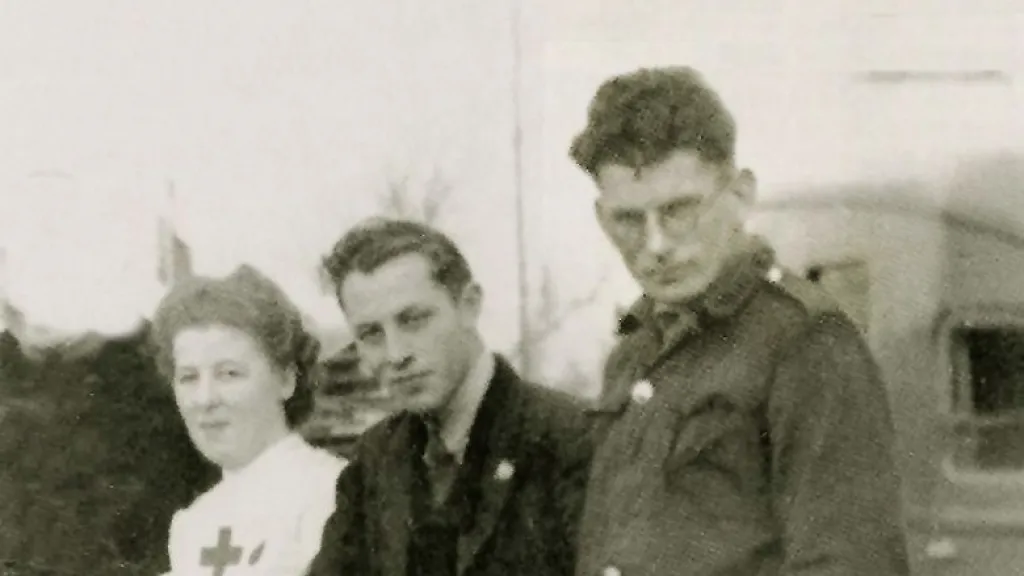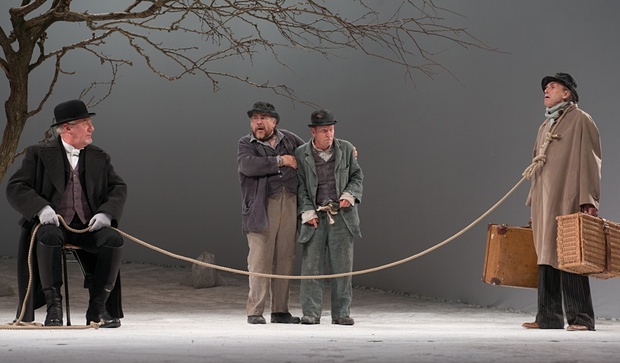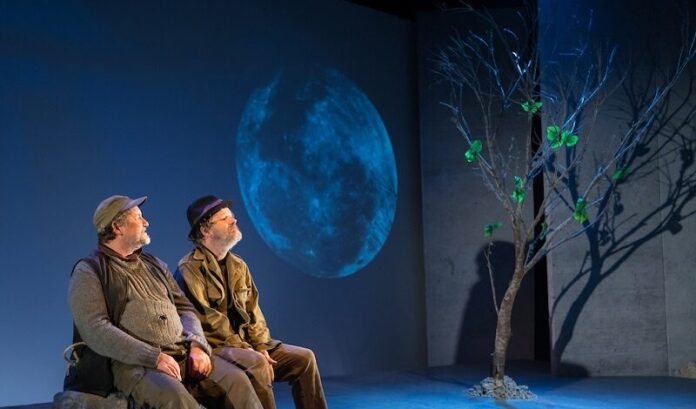By Katerina Taxiaropoulou,
“Why people have to complicate a thing so simple I can’t make out.”
Samuel Beckett
A tall, statuesque man with a carefully curated beard and round glasses… That is how some people like to picture Godot. Others imagine he has got blue eyes, long blond curls, and a crown of thorns on top of his head. Some read a scornful smirk in his expression, while others see the image as compassion. Ever since the premiere of Beckett’s Waiting for Godot, there has been great speculation about the identity of Godot.
When asked about who Godot was, Beckett replied that if he knew, he would have said so in the play. Many critics and spectators accused him of creating a mystery around the character of Godot on purpose, yet his answer was genuine. As Normand Berlin notes, Beckett wrote Waiting for Godot “in the interrogative mood” (The Massachusetts Review). Questions make up about one quarter of the play and most of them remain unanswered, as they tackle issues that are difficult to settle, like identity, death, and religion. Often in the play, the author makes spectators think that they have reached a positive answer and then takes it all back, adding a counterstatement to every statement. And, when the incessant talking subsides, silence comes as “the presence of an absence that is palpable, touching the heart of existence” (The Massachusetts Review). Godot best represents that gap of silence that people have so hard tried to fill by issuing a number of interpretations.
First, there is the political interpretation, which presents Godot as revolutionary during World War II. It is known that when the war hit France, Beckett was affiliated with the French Resistance and also volunteered for the Red Cross of Saint-Lô. Because of their association with Resistance, the playwright together with his partner were forced to flee occupied France. Otherwise, they would be arrested by the German police. Taking this context into consideration, some academics like Oliver Hirsch view Vladimir and Estragon as “two Jews” waiting for “a smuggler” to take them away from the German-occupied zone and into the Italian-occupied zone or Switzerland (BRNO Studies in English).

Another often articulated reading of Godot is the psychological one. According to this view, Didi, Gogo, and the absent Godot constitute Sigmund Freud’s Trinitarian description of the psyche: the Id, the Ego, and the Superego. Didi (id-id), who is a thoughtless and impulsive character, represents the Id, “the unconscious and instinctual side of our personality, which responds to our most primitive needs, demanding immediate satisfaction” (Nicolaie Florin). As discussed in the previous article, for the greatest part of the play Didi is concerned about physical pain, food, and sleep. In contrast, rational Gogo [(e)go-(e)go] represents the Ego, that part of our personality that keeps a “balance between the Id and the Superego” by fulfilling the Id’s needs without affecting others (Florin). Indeed, Gogo always provides a logical solution to every problem. He gives Didi a turnip when the latter is hungry, discourages him from committing suicide, and intervenes in heated interactions with authoritative Pozzo. Finally, Godot portrays the Superego, that side of our psyche that has “control over both the id and the ego, as it contains the morality principles and values taught by society” (Florin).
To understand this point, one needs to consider the major influence that Godot has over Estragon and Vladimir’s behavior. His is the final destination, the goal that they aspire to reach. Also, Godot is the reason why the two tramps are unable to think and act for themselves. As Parisa Shams underlines, they have “invested their hope in a supernatural or absent savior, rather than standing on their feet and determining their own fate as they are supposed to” (International Researcher). When for example they witness Pozzo’s abusive behaviour towards his slave Lucky, they do not react. They are so “preoccupied” with the act of waiting, that they “end up ignoring the immediate reality” (Florin).

This reliance on an outer, superior, force, a Savior as already mentioned, brings us to the final and most persistent interpretation of Godot’s character, the religious one. In this view, Godot represents God. It is a fact that in the play there are many implicit and explicit references to the Bible. Born in Catholic Ireland, Beckett was early on introduced to the literature of Christianity. As he grew older, however, he distanced himself from organized religion and turned to agnosticism. When asked during a libel action in 1937 whether he is a Christian, Jew, or atheist, Beckett replied “None of the three” (Breon Mitchell).
Many critics have argued that, in Waiting For Godot, Beckett rejects God as a form of salvation or compassion that fails to arrive. In fact, biographer Anthony Cronin claims that biblical references should be considered “ironic or even sarcastic” (Samuel Beckett The Last Modernist). This is not entirely true, however. As Mary Bryden notes, “the hypothesized God who emerges from Beckett’s texts is one who is both cursed for his perverse absence and cursed for his surveillant presence. He is by turns dismissed, satirized, or ignored, but he, and his tortured son, are never definitively discarded.” (Samuel Beckett and the Idea of God).
VLADIMIR: Do you remember the Gospels?
ESTRAGON: I remember the maps of the Holy Land. Coloured they were. Very pretty. The Dead Sea was pale blue. The very look of it made me thirsty. That’s where we’ll go, I used to say, that’s where we’ll go for our honeymoon. We’ll swim. We’ll be happy.
Samuel Beckett, quote from Waiting for Godot
Beckett’s work is deeply humanistic in the sense that it portrays humans’ ongoing suffering conditioned by the conflict between the world within and the world without: the unhospitable, senseless universe and humans’ hopes of meaning and eternal happiness. He does not reject belief in God as a higher force that leads us towards the right direction, but rather, our inaction throughout the journey. One should struggle, fight for their life instead of watching it pass by. Vladimir and Estragon are trapped in such a state of endless, passive waiting. Despite that, there is no criticism on the part of the author against the characters, but only sympathy for their affliction. They are after all humans and as humans, they are full of defects.
References
- Psychoanalytical approach to Becket’s “Waiting for Godot”. academia.edu. Available here
- WAITING FOR GODOT AND THE QUESTION OF HUMANISM. academia.edu. Available here
- Traffic of our stage: Why Waiting for Godot? web archive. Available here
- Samuel Beckett: A Bibliography. beckettarchive. Available here
- Samuel Beckett: The Last Modernist. Goodreads. Available here




